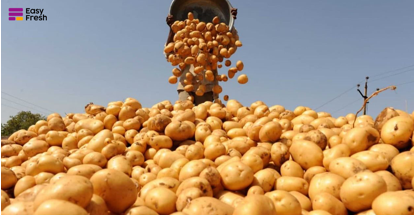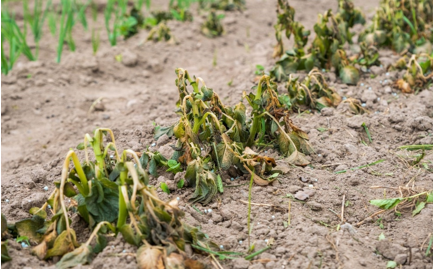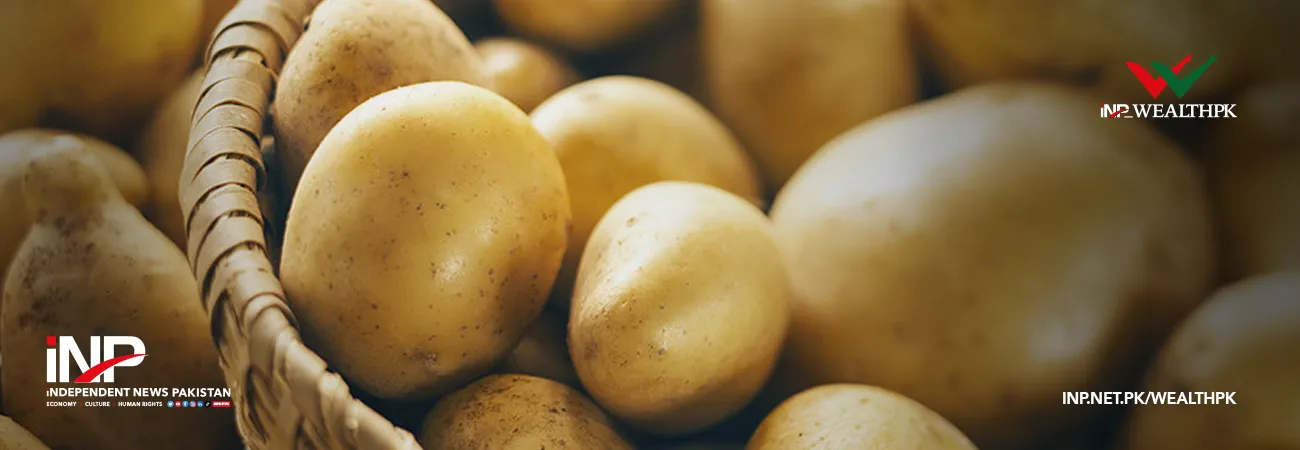آئی این پی ویلتھ پی کے
Ahmed Khan Malik
Potato production in Sindh has been adversely impacted by climate change, as growers complain of a fall in crop output, reports WealthPK.

Climate change has emerged as one of the most significant challenges to agriculture and its effects are increasingly visible in the province.
Among the various crops affected, potato production – an essential component of the local food system and economy – has shown noticeable signs of stress due to erratic weather patterns, shifting rainfall trends, and rising temperatures, growers told WealthPK.
Potato crop is particularly sensitive to climate change, especially during their growth and tuber development stages.

“Historically, Sindh’s favorable winter climate has allowed for successful cultivation of potato. However, the changing climate is disrupting this balance, causing a range of direct and indirect impacts on yields, quality, and profitability,” said Syed Nawaz Shah, a leading grower in Mirpur Khas district of the province. He noted that one of the primary concerns is the rise in average temperatures, especially during the critical growing months from October to January.
Potatoes thrive in cooler climates, and excessive heat can delay tuber initiation, reduce tuber size, and even lead to premature sprouting. “In recent years, farmers have reported shortened growing seasons and lower yields due to unexpected heatwaves and warm nights,” he said, adding that unpredictable rainfall patterns add to the problem. He pointed out that farmers now face difficulties with water management due to prolonged dry spells or sudden unseasonal rains.
Heavy rainfall can lead to waterlogging, root diseases, and increased pest infestations. Conversely, drought-like conditions force farmers to rely more heavily on groundwater, raising concerns over water sustainability and cost. Mola Bux Keerio, a grower in Shaheed Benazirabad district, said pests and diseases, such as late blight and early blight, are also increasing in incidence and severity.
Climate change creates favorable conditions for these pathogens to thrive. Farmers are often compelled to use more chemical pesticides to combat these threats, increasing production costs and posing environmental and health risks. Besides, higher temperatures and inconsistent soil moisture levels affect starch content and skin quality of tubers, reducing their market value.
For smallholder farmers, who form the backbone of Sindh’s agricultural economy, this translates to lower incomes and greater financial uncertainty, he said. To adapt to these changes, the growers need climate- resilient farming techniques. These include adopting heat-tolerant and disease-resistant potato varieties, improving irrigation efficiency through drip systems, and practicing integrated pest management.
There is also a growing need for government support in the form of training programs, subsides for adaptive technologies, and improved weather forecasting services. Keerio urged research institutions and agricultural extension departments to work closely with farmers to develop localized solutions. With coordinated efforts and timely intervention, it is possible to mitigate the adverse effects of climate change on potato production in Sindh, he said.
He said while climate change presents a formidable challenge to potato farming in Sindh, strategic adaptation and policy support can help farmers safeguard their livelihoods and ensure food security in the region. “Continued investment in climate-smart agriculture is essential to build resilience and sustain potato production in the face of an increasingly unpredictable climate,” Keerio believed.
Credit: INP-WealthPk












